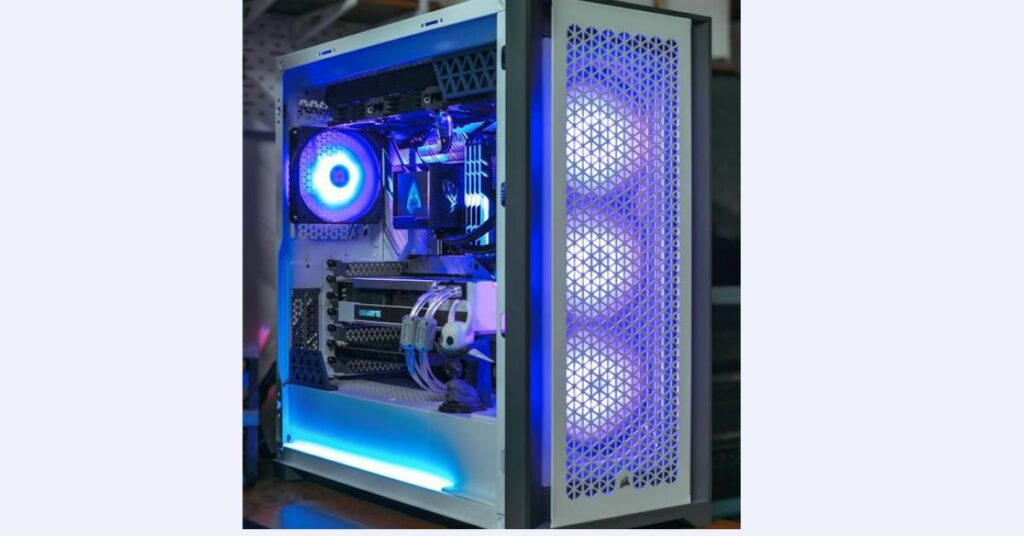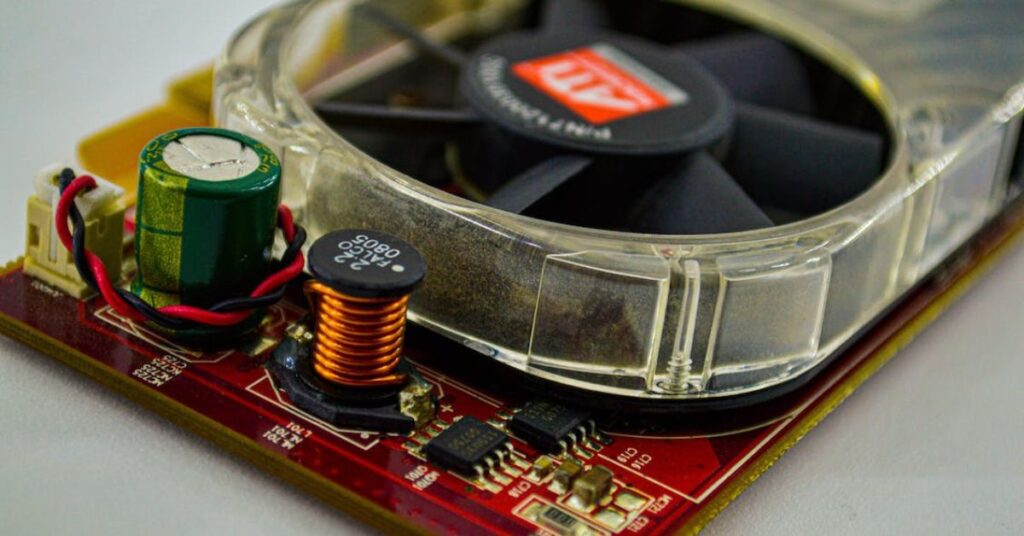In the heart of every computer lies the central processing unit (CPU), a powerhouse that tirelessly crunches numbers, runs programs, and executes commands. But with great power comes great heat – and that’s where cooling systems like fans come into play. But what if you’ve ever wondered, Is it OK to run a CPU without a fan?
To answer this topic, let’s learn the role that CPU cooling plays, the importance of CPU fans, and the possible consequences of running a CPU without a fan.
Table of Contents
The function of CPU cooling

Simple yet vital, CPU cooling prevents the CPU—the brains of your computer—from overheating. The truth is that CPUs are your computer’s engines; they are always working to complete calculations and produce heat in the process. Without enough cooling, this heat might quickly accumulate and could damage your system.
Similar to fans, cooling systems remove heat produced by the CPU by whisking it away. The fan helps to remove heat and maintain a safe temperature by forcing air over the CPU. Imagine it as a pleasant wind that keeps the brain of your computer comfortable and working.
Maintaining the delicate balance between performance and temperature is essentially what CPU cooling is all about. You can guarantee your computer system will run smoothly and last a long time by keeping the CPU cool. Thus, even though it might not seem like much, CPU cooling is crucial to maintaining the efficiency of your computer.
The Importance of CPU fans

Can the computer work without a fan?
Sure, it can technically run without a fan, but it’s like driving a car without coolant – you might get away with it for a short time, but eventually, things will overheat and break down.
How much time do you run a PC without a fan?
Running a PC without a fan is a bit like playing with fire. Sure, it might work for a short while, but the longer you go without proper cooling, the higher the risk of damaging your CPU and other components.
Without a Cooling system gaming is not possible
For gamers out there, imagine trying to play your favorite game in the scorching heat of summer without any air conditioning. Your computer needs that cooling system to keep it cool, especially during intense gaming sessions where the CPU is working overtime.
Futrther reading: How TO Connect Case Fans To The Motherboard?
Running a CPU without a fan will lead to overheating
Picture this: your CPU is like a hot potato – it generates heat while working hard to process all your tasks. Now, imagine taking away the fan, the cool breeze that keeps that potato from scorching your fingers. Without it, things can get toasty real quick.
Without a fan, heat will continuously build up in the CPU. It’s like being stuck in a room on a sweltering summer day with no air circulation – the temperature just keeps rising.
The CPU will quickly reach or exceed maximum safe temperatures. Think of it as pushing your computer to run a marathon in the desert without any water – it’s bound to overheat and shut down.
This extreme heat can cause the CPU and system to shut down or be permanently damaged. Just like how too much sun can fry your skin, too much heat can fry your CPU, leading to irreversible damage.

Signs your CPU is overheating without a fan
So, you’ve dared to run your CPU without a fan – but how do you know when things are getting too hot to handle?
Here are some warning signs to keep an eye (and nose) out for:
- Computer randomly shutting off or freezing: Just like how you might collapse from heat exhaustion on a scorching day, your computer might shut down or freeze to protect itself from overheating.
- BIOS giving overheating warnings: It’s like your computer’s way of saying, “Hey, I’m feeling a bit too toasty in here – maybe cool me down a bit?”
- Thermal throttling slowing CPU performance: Imagine trying to run a race while wearing a heavy winter coat – your CPU might slow down to prevent itself from overheating.
- Strange behavior, crashes, and errors: Your computer might start acting like a confused toddler – throwing tantrums, crashing programs, and displaying strange error messages.
- Burning smell coming from the computer: If you start smelling something burning, it’s not your imagination – it could be your CPU cooking itself from the inside out.
Solutions if your CPU fan stops working
Uh-oh, your CPU fan decided to take an unexpected vacation – but don’t panic just yet. Here’s what you can do to get things back on track:
- Shut down immediately and do not boot up: It’s like hitting the emergency stop button – shutting down your computer ASAP can help prevent further damage.
- Open up the case and inspect the CPU fan for issues: Think of it as giving your fan a check-up – look for any signs of damage, dust buildup, or strange noises.
- Replace the CPU fan if it is broken, clogged with dust, or making noise: Sometimes, a simple swap is all it takes to get things running smoothly again. Just make sure to choose a compatible replacement fan.
- Consider upgrading to a better CPU cooler or external fan: If you’re constantly battling overheating issues, it might be time for an upgrade. Investing in a better CPU cooler or an external fan can help keep things cool and quiet.
- Do not operate the PC without fixing the CPU fan issue: It’s like driving a car with a flat tire – sure, you might be able to limp along for a bit, but you’re just asking for trouble. So, resist the temptation to ignore the problem and fix that fan ASAP.
Dealing with a dead CPU fan might seem like a hassle, but taking swift action can help prevent bigger headaches down the road. So, roll up your sleeves and get that fan spinning again – your computer will thank you for it.
Alternatives to fan cooling
While fans are the go-to solution for keeping CPUs cool, there are a few alternatives worth considering:
- Liquid Cooling: Think of it as giving your CPU a refreshing dip in a cool pool. Liquid cooling systems use a combination of water or coolant and a radiator to dissipate heat more efficiently than air alone.
- Heat Sinks: Imagine giving your CPU a set of metal fins to help it cool off – that’s essentially what heat sinks do. They work by increasing the surface area for heat dissipation, allowing the CPU to stay cooler.
- Thermoelectric Cooling: It’s like having a mini fridge for your CPU. Thermoelectric cooling systems use the Peltier effect to transfer heat away from the CPU, keeping it nice and chilly.
- Phase-Change Cooling: Ever wish you could magically turn your CPU’s heat into ice? Well, phase-change cooling systems come pretty close. They use a refrigeration cycle to cool the CPU below ambient temperatures, ensuring frosty performance.
- Passive Cooling: Sometimes, the simplest solution is the best one. Passive cooling systems rely on natural airflow and heat dissipation to keep the CPU cool, making them a quiet and energy-efficient option.
Final thoughts
Maintaining a cool CPU is crucial for durability and peak performance in the world of computers, not just for comfort. Although fans are the most popular type of cooling solution, even greater results can be obtained by investigating alternatives like heat sinks, liquid cooling, and thermoelectric cooling.
But one thing is certain: you should never undervalue the significance of appropriate CPU cooling. Making sure your CPU doesn’t overheat, crash your computer, or cause expensive damage—whether you’re a casual user perusing the web or a gamer straining your system to the maximum.
So, the next time you power up your computer, take a moment to appreciate the humble CPU fan – or whichever cooling solution you’ve chosen – for keeping things running smoothly. After all, a cool CPU is a happy CPU, and a happy CPU means a happy you.
FAQ
Can I run my CPU without a fan for a short period?
While it’s technically possible, running your CPU without a fan even for a short time can risk overheating and damage. It’s best to avoid it altogether.
Can I overclock my CPU without additional cooling?
Overclocking typically increases the heat output of a CPU, so additional cooling is often recommended to prevent overheating and maintain stability.
Are there any risks associated with liquid cooling systems?
While liquid cooling systems can be effective at dissipating heat, they do come with some risks such as the potential for leaks. Proper installation and maintenance are important to mitigate these risks.
